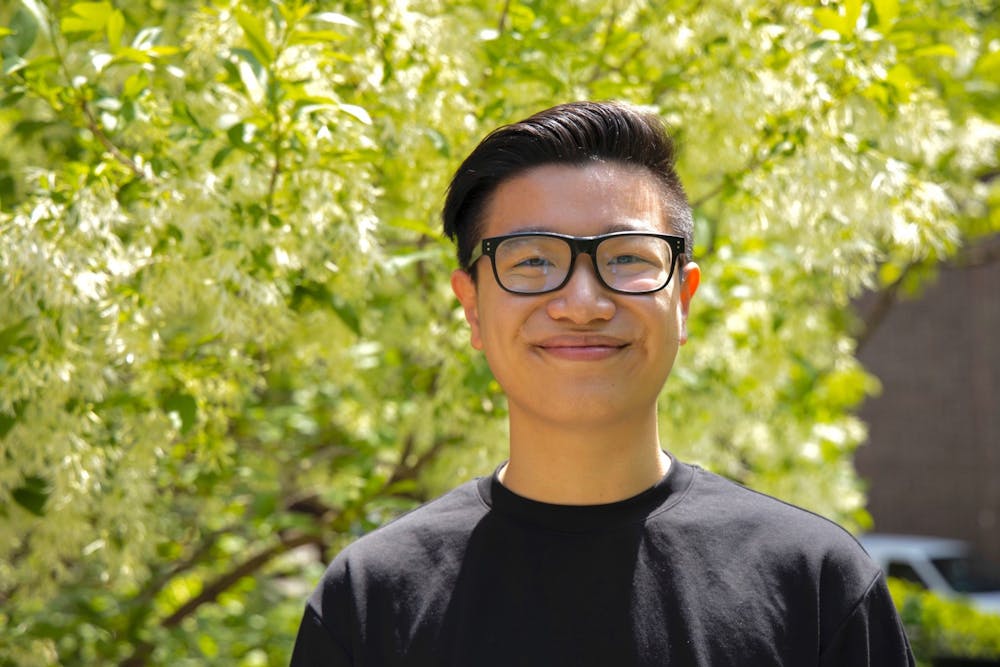It's 9 a.m. on a wintery Tuesday in the middle of Stommons, and unexpectedly, my day begins with a smile and a hug. Within the first five seconds of our meeting, Steven Chen eases any pre–interview butterflies lingering in my belly. The plan is to ask a few questions, sip my lukewarm cappuccino, and take notes. But as I listen, I can already tell it's going to be one of those mornings that weigh on my mind and my heart for the rest of the day.
Steven’s initial warmth reveals a lot about who he is as a person. My suspicion is that he’s not just being nice and friendly to the Street reporter who badgered him to meet at 9 a.m. right before finals week. He’s just welcoming to anyone and everyone who could use an early morning smile. “My parents always taught me to use my education and resources to support other people,” he explains.
And Steven does exactly that. Every Friday afternoon, Steven leads the OurSpace Sexual Health Education Program—a collaboration between the Netter Center and the LGBT Center—to teach high school students, along with Penn students, the need–to–knows about queer sexual health. OurSpace was established in the spring of 2021, and after helping to facilitate the program, Steven was asked to become the OurSpace coordinator by his supervisor, Paulette Branson.
“There’s a lot of stigma and toxicity surrounding discussions on queer sexual health and sexual health in general, so we just want to change that from the ground level,” he says. A health and societies major and urban education minor, Steven knew early on in his education that he wanted to combine the two disciplines while studying pre–med at Penn.
OurSpace fills the gap between those two fields of study. Steven facilitates financial literacy workshops, community building exercises, and queer history lessons. Last semester, the team administered ten sexual health workshops through the Mazzoni Center. “It’s a very queer–inclusive sexual education, especially because through the research I did in the summer and through talking in general with a lot of health actors in West Philadelphia, I realized that there is no access to comprehensive queer health education,” Steven says. “A lot of health educators feel uncomfortable talking about these topics.”
That’s why Steven and his team feel it necessary to provide a learning opportunity for their students. On Fridays from 4 to 6 p.m., they first lead general OurSpace programming before using the last hour for health education programming. The trademark inclusive atmosphere is fostered through activities like arts and crafts and learning American Sign Language for the hard–of–hearing students and staff.
The group is working on setting up Gay–Straight Alliances (GSAs) in the Netter Center’s University–Assisted Community Schools (UACS) with hired part–time staff and Penn students. “Even Penn students, including myself, have never had these resources. Everyone loves it and is learning together, which is a super powerful piece of the program,” Steven tells me. His hands gesticulate excitedly and there is no way to deny his passion for OurSpace. “GSAs in general are not only about facilitating these spaces in Penn for Penn students, but also about facilitating these queer–inclusive spaces in the high schools,” he says.
COVID–19 restrictions originally made it quite difficult to gather students and build connections. But Steven says that outside of logistics, a major obstacle was "actually defining what [his] program wanted to do and what OurSpace wanted to do—just [finding] a sense of community.”
Steven emphasizes that a program can’t be developed without feedback from those on the receiving end. “I think the main challenge was just finding my program and centering it in the community’s voice. It was the most challenging, but rewarding, part,” he continues. “Nothing was better than hearing my students say, ‘Thank you. I’m learning so much, and I needed all of these tools.’”
The Warminster, Pa., native still doesn’t think that things are all sunshine and roses at Penn for the LGBTQ community. In his opinion, Penn could do better in providing support to queer students of color and other intersecting identities, such as first–generation and low–income students. Steven emphasizes that Penn's queer community has a voice, and that voice deserves to be heard. There’s a lot more that can be done to foster inclusivity and change on campus.
In fact, Steven seeks to provide a hub for Penn students to feel safe and truly understand their roles on campus through community engagement. He specifically wants OurSpace to be an organization that supports the UACS and their GSAs. In the upcoming semester, Steven and his team will be working on professional development curricula, such as online resources and workshops, to answer the question about how to foster queer–inclusive spaces in UACS classrooms. “I want OurSpace to be that collaboration between the queer community in West Philly and Penn, and the connection that intertwines the two populations,” he says passionately.
But Steven’s warmth and enthusiasm extends far beyond the confines of the coffee shop where we sit talking. One time he constructed a makeshift Escape Room game for his students by hiding murder mystery clues under the pillows of the LGBT Center’s Reading Room. “Having the high school students and Penn students work together to solve their way to an escape was amazing,” he says with a smile. With a twinkle in his eyes, he adds, “Honestly, those escape rooms are so hard—I’m not sure if Penn students [alone] would have even been able to solve it!”
What's more, every email Steven sends to those involved in OurSpace is addressed to the “OurSpace Family”—and he means it. To Steven, his OurSpace family is everything. I have no doubt the OurSpace community feels the same way about him.

